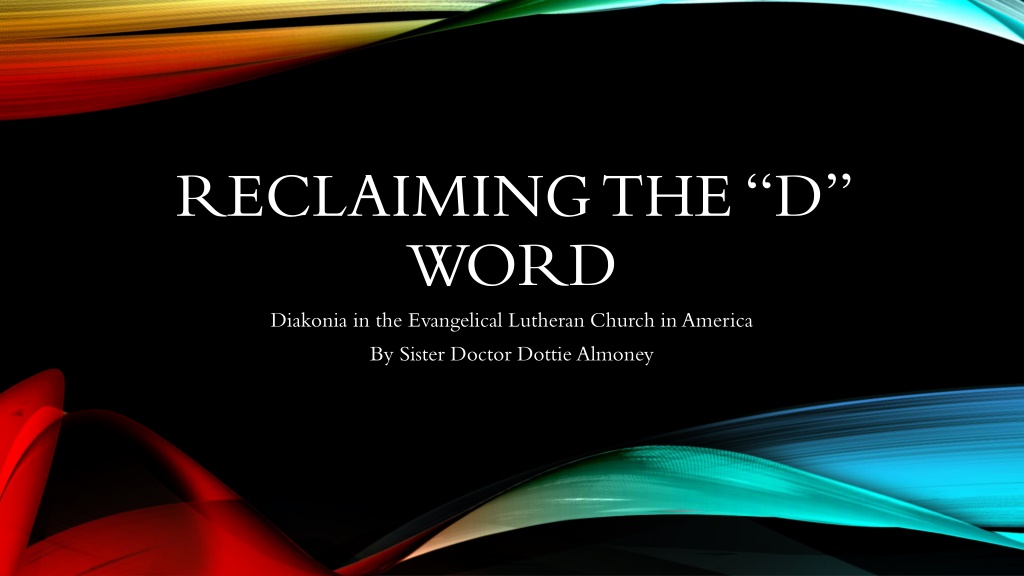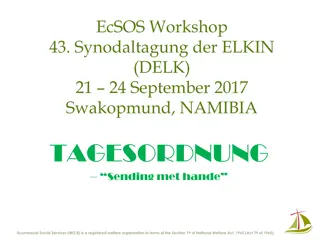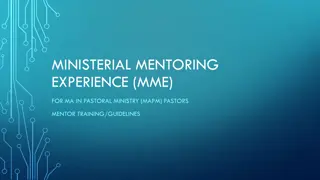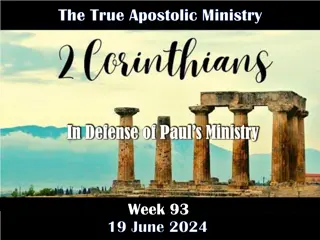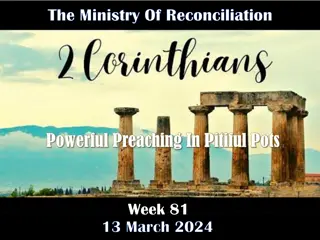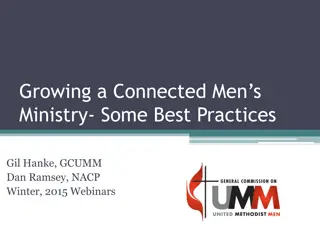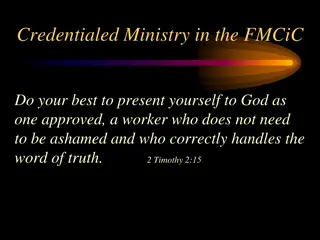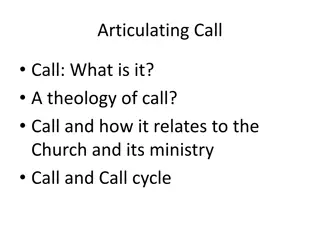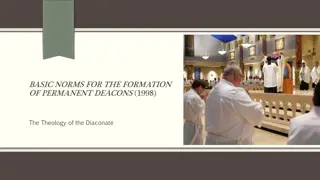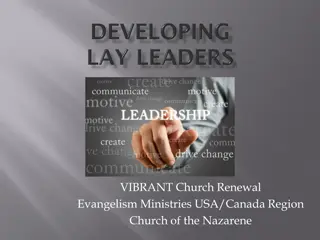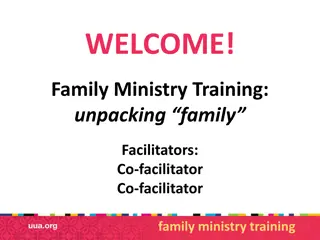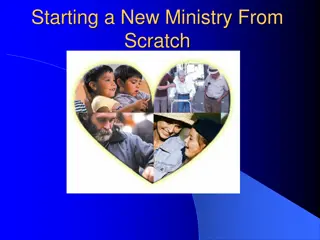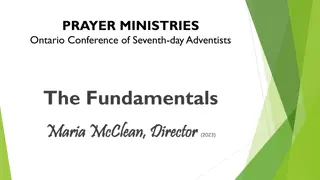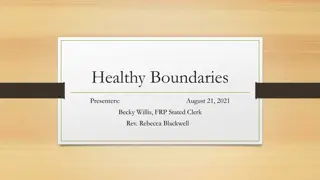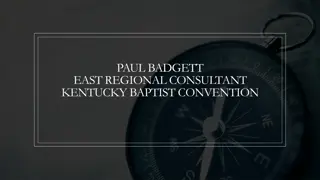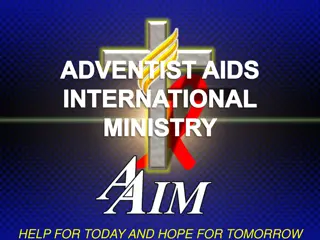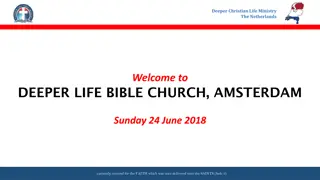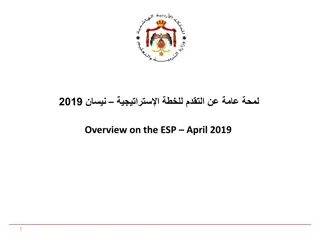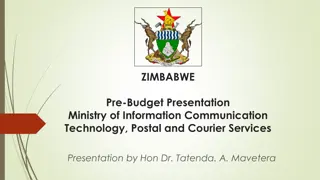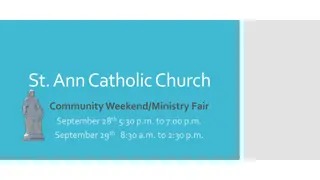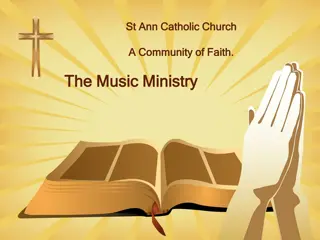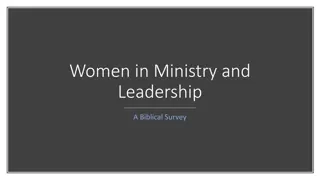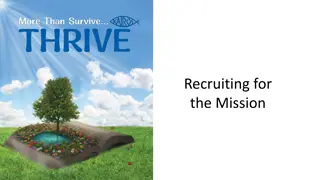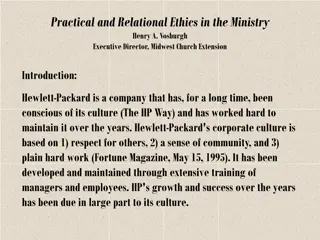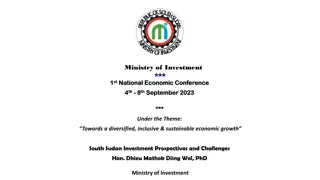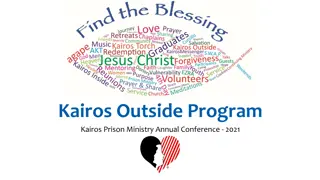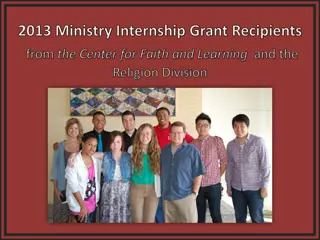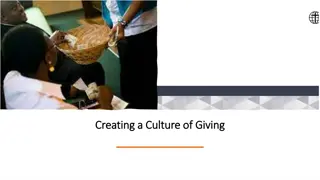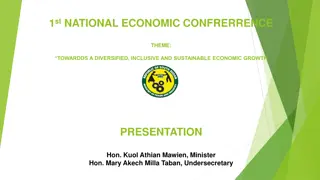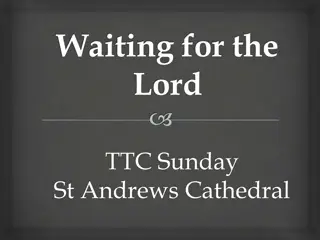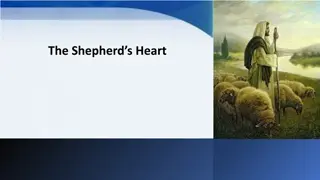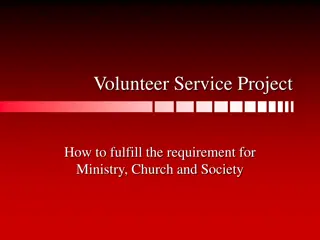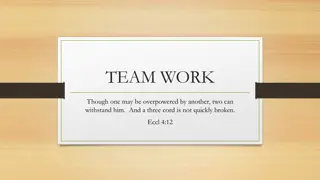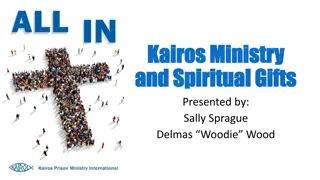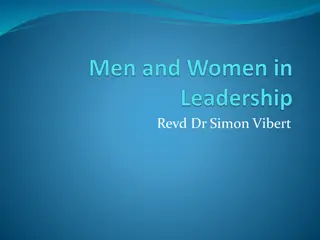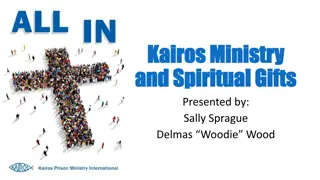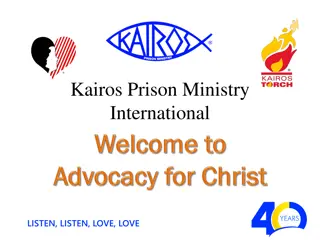Diakonia: Understanding the Ministry of Service
Discover the profound essence of Diakonia - a service ministry focused on justice and wholeness, deeply rooted in biblical teachings and the ministry of Jesus Christ. Unveil its transformative and prophetic nature addressing the root causes of suffering in the world, tracing back to ancient Greek origins and evolving into a symbol of selfless service and love. Explore the historical journey of Diakonia through Judaism, biblical teachings, Early Christian Church, European Church restructuring, and the 18th/19th-century revival, leading to its role in addressing social issues in the United States.
Download Presentation

Please find below an Image/Link to download the presentation.
The content on the website is provided AS IS for your information and personal use only. It may not be sold, licensed, or shared on other websites without obtaining consent from the author. Download presentation by click this link. If you encounter any issues during the download, it is possible that the publisher has removed the file from their server.
E N D
Presentation Transcript
RECLAIMING THE D WORD Diakonia in the Evangelical Lutheran Church in America By Sister Doctor Dottie Almoney
MY ASSUMPTIONS. The full scope of Diakonia is not understood in our congregations Diaconal leaders themselves are not always aware of the complete ministry of Diakonia Congregations/Synods and other church leadership are usually uninformed of the ministry of diakonia or the role of professional deacons/diaconal ministers in the church.
UNDERSTANDING DIAKONIA a service ministry that focuses on bringing about justice and wholeness in the world; from the Greek Diakonos which means service. This term is a holistic holisticconcept and practice rooted in the biblical story and the ministry of Jesus Christ. It is a transformational and prophetic transformational and prophetic ministry that aims to aims to address root causes of pain and suffering in the world. address root causes of pain and suffering in the world.
Ancient Greeks also used this word (diakonia) to mean serve at the table table . This word had an evolution from being seen as a demeaning activity as understood by the ancient Greeks to a mandate given to followers of Jesus Christ as written in the Bible. The Christian movement took a Greek term with somewhat menial connotations and, true to the words and examples of Jesus, made it an emblem of all-loving service to others. serve at the
UNDERSTANDING DIAKONIA Rooted in the Biblical Story Rooted in the Biblical Story ..learn to do good; seek justice, rescue the oppressed, defend the orphan, plead for the widow. Isaiah 1:17 . Truly I tell you, just as you did it to one of the least of these who are members of my family, you did it to me . Matthew 25:35-40 The Spirit of the Lord is upon me, because he has anointed me to bring good news to the poor. He has sent me to proclaim release to the captives and recovery of sight to the blind, to let the oppressed go free, to proclaim the year of the Lord s favor. Luke 4:18-19 He has told you, O mortal, what is good; and what does the Lord require of you but to do justice, and to love kindness, and to walk humbly with your God? Micah 6:8
HISTORY OF DIAKONIA IN THE US Judaism Biblical Teaching Jesus Deacons in Early Christian Church Restructuring of the diaconate in the European Church (Early Church thru 18th centuries) 18th/19thCentury Revival of the role of the diaconate European Motherhouses Deaconesses to United States 1860 s Social Problems in the United States
UNDERSTANDING DIAKONIA Diakonia involves not only providing resources, but confronting powers and structures that cause people to stay marginalized. and structures that cause people to stay marginalized. Authentic diakonia is challenging the injustices and abuse of powers that continue to exploit God s people and prevent them from obtaining their basic needs. Diakonia is a transformational ministry meets immediate needs but goes further in helping to transform and change paradigms that keep God s people from flourishing confronting powers Band-Aid Ministry Supplying Food for those in poverty Transformational Ministry Advocating for a higher minimum wage Both are Needed until Full Transformation occurs
ECUMENICAL DIAKONIA Diaconal work encourages looking past denominational theological differences and working together to address problems of social injustice Working together ecumenically provides more resources in which to work on behalf of God s children (work already being done denominationally) Diakonia is relational, not just within a particular denomination, but in the wider ecumenical community that practices diaconal ministries.
ECUMENICAL DIAKONIA The Diakonia World Federation founded in 1947 Built upon the work of Theodore Fliedner and his ecumenical work links and gathers those who are engaged in diaconal work worldwide across denominations and cultures encourages, supports and empowers the development of groups doing diaconal work lives what it preaches as it pertains to diakonia; diakonia as a way of life We are stronger together and can accomplish more for God s kingdom
DIAKONIA INFORMED BY LITURGY Diakonia is fed from the liturgy in the church, from its sacramental liturgies, music, scriptures, prayers, sermon and the sending. (Lutheran) liturgy is where diakonia starts and we are sent out to be the hands, feet and voice of Christ in the world. Baptism/Affirmation of Baptism The call to diakonia is present in our Lutheran baptismal liturgy as well as our Affirmation of Baptism or Confirmation liturgy. Parents and sponsors promise on behalf of their children, to proclaim Christ through word and deed, care for others and the world God made, and to work for justice and peace.
DIAKONIA INFORMED BY LITURGY In the Lutheran Affirmation of Baptism (Confirmation) Liturgy, the confirmand pledges to proclaim the good news of God in Christ Jesus through word and deed, to serve all people, following the example of Jesus, and to strive for peace and justice in all the earth. The Eucharist The deacons in the early church were responsible for making sure there was equitable food distribution among all people. Diakonia in relation to food and table fellowship involves issues of reciprocity, hospitality, and sharing. We come to a table to be fed and nourished to go out and do the work of Christ in the world.
DIAKONIA INFORMED BY LITURGY Diakonia through the Message of the Gospel and through our music The Sending: The sending calls us to go outside of the walls of the church to bring peace, justice and service towards God s creation. Go in peace, serve the Lord , reminds us that serving God also means serving our neighbor. God blesses us and sends us out in mission to the world. God s mission includes the gifts of grace that we share in worship and take to the absent; now, we are sent to continue our participation in God s mission.
PROPHETIC DIAKONIA There is no theological teaching of Luther that is politically innocent. His theology and politics must be distinguished but never separated. Luther himself is thus the first and best witness that the so-called, Two-Kingdoms Doctrine does not lead to political abstinence but exactly the opposite: the world as a whole with its problems and decisions is now discovered as the subject of Christian responsibility. (Ryan P Cumming, The Forgotten Luther II)
PROPHETIC DIAKONIA Misunderstanding of Separation of Church and State Doctrine Misunderstanding of Separation of Church and State Doctrine Jefferson wrote, the government should not have any influence over religious opinions. The government cannot tell people who, what and or how to worship. Jefferson was not suggesting that religious people or religious motivations should be exiled from public debate.
PROPHETIC DIAKONIA Martin Luther, who wrote over one thousand letters to civil authorities condemning public policies that thwarted the well being of the poor. Luther also admonished preachers to preach against injustice and against economic injustice and practices that resulted in oppression of the poor. Luther spoke publicly regarding political, military, economic and theological issues and took stands on which he staked his life. Martin Luther believed that political problems should be addressed in the pulpit.
PROPHETIC DIAKONIA As ministers of word and service, deacons too are called to diaconal preaching in the pulpit as well as the public square. This can be risky, especially as we confront social and political issues that are considered hot button topics that may dissolve a type of perceived unity in the church. Many preachers who long testify against injustice and oppression may fear alienating congregational members by their prophetic witness.
PROPHETIC DIAKONIA As preachers, we can look to the works of Dietrich Bonhoeffer, German theologian and pastor who lived during Nazi Germany. He argued, As much as the Christians would like to remain distant from political struggle, nonetheless, even here the commandment of love urges the Christian to stand up for his neighbor. This includes standing up and speaking out in the pulpit.
DIAKONIA AS TRANSFORMATION Rev. William J. Barber II, co-founder of the Poor People s Campaign, said, Faith-rooted moral dissent requires that we always look forward toward the vision of what we know we were made to be. Truly authentic diakonia involves both comforting the victim and confronting the powers that oppress. It must bring healing and reconciliation to the victim as well as the one who victimizes. Diaconal transformation cannot be divorced from advocacy for justice and peace
DIAKONIA AS TRANSFORMATION Transformation cannot happen without identifying with Christ, identifying with the suffering of the world, with the oppressed, the poor, the disenfranchised, the abused. The diaconate calls the whole church, clergy and laity, to see the suffering of the world and to be involved. We are to bear one another's burdens not to make others dependent, but to express solidarity and support, to be agents of healing and hope.
DIAKONIA AS TRANSFORMATION We are not to simply bandage the wounds of victims beneath the wheels of injustice, we are to drive a spoke into the wheel itself. Dietrich Bonhoeffer The early Christians rejoiced when they were deemed worthy to suffer for what they believed. In those days the Church was not merely a thermometer that recorded the ideas and principles of popular opinion; it was a thermostat that transformed the mores of society. Martin Luther King Jr., Letter from the Birmingham Jail
DEACONS UNDERSTANDING OF DIAKONIA Service Ministry bridging church and world ministry of education for people who want to serve in the Church, but for various reasons are not pursuing an academic degree Grounded in the baptismal call and fueled by the sacraments, the ministry of diakonia is the ministry of activating the body of Christ for the sake of the world, and caring for the needs of the world with the gifts of the body of Christ. We take care of and advocate for the members of our congregation or the agency we represent! Sharing God s love and word
THE ROLE OF DEACONS/DIACONAL MINISTERS/DEACONESSES Educate and Equip the Saints to carry out their discipleship and their call to diakonia Bridge church and world Educate on social justice issues Be the hands, feet and voice of Christ Use of Scriptures and confessional documents in order to address issues Be a prophetic voice in naming unjust systems and policies Educate others on the role of diaconal ministers Be aware of ecumenical ministries and opportunities to serve our neighbors Move individuals and congregations from solely band-aid ministry to transformational ministry Be a risk taker for the sake of the Gospel!
QUESTIONS TO THINK ABOUT. What is your understanding of Diakonia? How can you move from reactional (immediate needs) to transformational diakonia? How can you intentionally engage in ecumenical diakonia? What barriers do you face in moving towards a more transformational model of diakonia? Justice and righteousness was never meant to be the work of only one person, or one part of society. It should be the foundation of how everyone stewards their lives, as well as an integral, normal part of all of society. Every aspect of this world needs God s justice and righteousness. Jessica Nicholas
